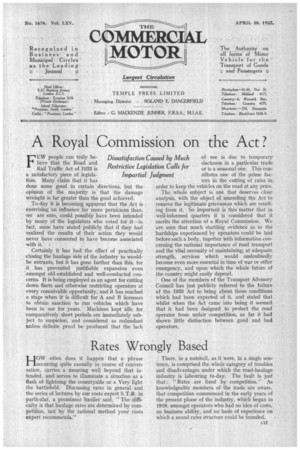A Royal Commission on the Act?
Page 71

If you've noticed an error in this article please click here to report it so we can fix it.
lieve that the Road and people can truly be Rail Traffic Act of 1033 is a satisfactory piece of legislation. Many claim that it has done some good in certain directions, but the opinion of the majority is that the damage wroUght is far greater than the good achieved.
To-day it is becoming apparent that the Act is exercising an influence far more pernicious than, we are sure, could possibly have been intended by many of the legislators who voted for it—in fact, some have stated publicly that if they had realized the results of their action they would never have consented to have become associated with it. • Certainly it has had the effect of practically closing the haulage side of the industry to wouldhe entrants, but it has gone further than this, for it has prevented justifiable expansion even amongst old-established and well-conducted concerns. It is being employed as an agent for cutting down fleets and otherwise restricting operators at every conceivable opportunity, and it has reached a stage when it is difficult for A and B licensees to obtain sanction to run vehicles which have been in use for years. Machines kept idle for comparatively short periods are immediately subject to suspicion, and considered as redundant unless definite proof be produced that the lack of use is clue to temporary slackness in a particular trade or is a seasonal one. This constitutes one of the -prime factors in the cutting of rates in order to keep the vehicles on the road at any price.
The whole subject is one that deserves close analysis, with the object of amending the Act to remove the legitimate grievances which are resulting from it. So important is this matter that in well-informed quarters it is considered that it merits the attention of a Royal Commission. We are sure that much startling evidence as to the hardships experienced by operators could be laid before such a body, together with information concerning the national importance of road transport and the vital necessity of maintaining, at adequate strength, services which would undoubtedly become even more essential in time of war or other emergency, and upon which the whole future of the country might easily depend.
One of the members of the Transport Advisory Council has just publicly referred to the failure of the 1933 Act to bring about those conditions which had been expected of it, and stated that whilst when the Act came into being it seemed that it had been designed to protect the road operator from unfair competition, so far it had shown little distinction between good and bad operators.








































































































































































